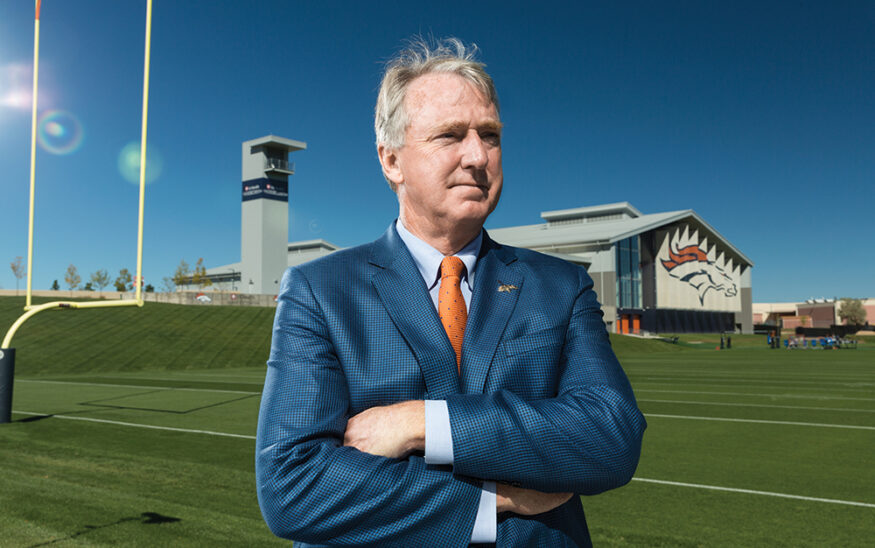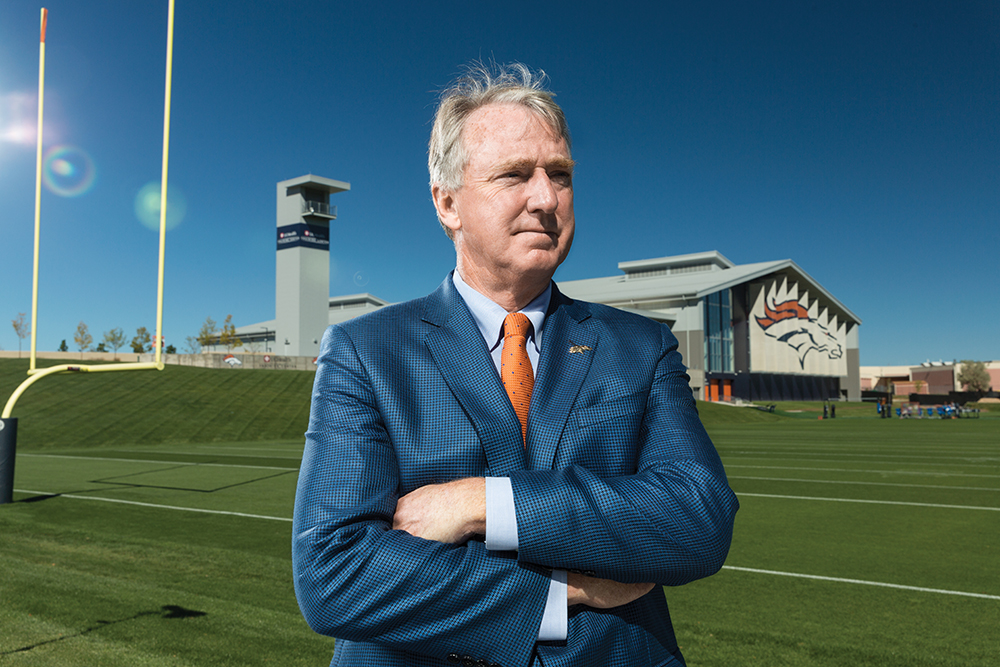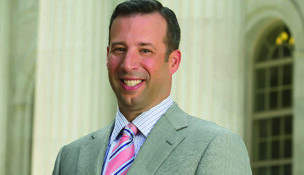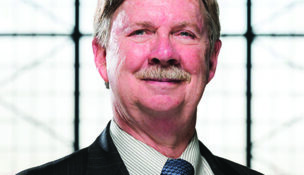CEO of the Year: Joe Ellis goes long
The Denver Broncos’ president and CEO is decisive and deliberate
Stewart Schley //November 1, 2016//


CEO of the Year: Joe Ellis goes long
The Denver Broncos’ president and CEO is decisive and deliberate
Stewart Schley //November 1, 2016//

Joe Ellis steered his company car to the crest of La Veta Pass, rising from the swirls and curves of U.S. Route 160 to reach the road’s high point, where the wide floor of the San Luis Valley beckoned below. Alamosa was dead ahead, and beyond it the little town of Del Norte. Both were familiar stops within Ellis’s territory, a broad swath of southern Colorado where scattered exits from Lamar to Pagosa Springs led to local grocery stores and the people who ran them. Twenty-two years old and newly graduated from Colorado College, Ellis had a car, a job selling caps and T-shirts to retailers and a take-home salary of $1,000 a month.
“I was living large,” Ellis says. “I never had so much money.”
Ellis didn’t know it, but his future was riding shotgun over long stretches of Colorado roads in 1979.
“We were selling Denver Broncos merchandise to supermarkets at the time,” remembers Tom Burke, a Denver-based business owner who had been impressed enough by Ellis to hire him, unproven and untested, straight out of college. “So he kind of started early with the Broncos.”
Some combination of fate or destiny or sheer coincidence has tied Ellis to the Broncos ever since. Thirty-five years after he prowled southern Colorado with a product list, Ellis succeeded team owner Pat Bowlen as CEO of the Denver Broncos Football Club and the organization’s Stadium Management Co. affiliate. Previously chief operating officer, Ellis added the title of president in 2011 and was elevated to the CEO post in July 2014 when Bowlen, struggling with a worsening Alzheimer’s condition, relinquished day-to-day operational control.
At a 2011 press conference tied to the reorganization that made Ellis president, he was the man literally in the background. The cameras and the media attention were trained instead on John Elway, the former quarterback and legendary comeback kid who had returned to run the Broncos football operations, reporting to Ellis. The moment was a metaphor for Ellis’ professional career: understated, considerate and above all, deferential.
Nowhere in Ellis’s official biography, for example, is there mention of a link to one of America’s foremost families: the Bushes. (Ellis’s mother is the lone sister of former U.S. President George H. W. Bush). To those who know him, that’s to be expected.
“He has no ego whatsoever,” says Paul Tagliabue, the former National Football League commissioner who hired Ellis in 1990. “Joe is decisive but deliberate. And he’s willing to share victories and defeats in an even-handed way.”
Impressive record
Lately, the victories have been piling high. After adding responsibility for day-to-day operations in 2011, Ellis has managed an organization that won five consecutive AFC West titles and six playoff games while racking up 68 regular season and playoff wins to produce a .731 winning percentage. Since Ellis was named CEO two summers ago, the Broncos have retooled the coaching staff, elevated the winning percentage to .775 (through four games of the current season), won an AFC Championship in dramatic style at home and dominated a Super Bowl opponent to collect a third Lombardi trophy.
In the meantime, the team’s estimated market value has soared to $2.4 billion as of August 2016 from $1.5 billion two years earlier, according to estimates published by Forbes. During a tumultuous period for the Broncos, as the team’s longest-tenured owner relinquished day-to-day control, Ellis and his executive team at Dove Valley have managed to accomplish exactly what his boss wanted to do: put a championship team on the field and make a few million fans deliriously happy. Recognizing these achievements, ColoradoBiz has named Ellis 2016 CEO of the Year.
The selection is about more than football. As CEO, Ellis oversees a company with 206 employees (not including players), an annual payroll approaching $200 million, two professional sports teams (the Broncos and the Denver Outlaws), estimated annual revenue of close to $400 million, fully staffed human resources, IT and sales departments, and physical facilities that demand constant care and investment. Beyond the pressures confronting almost every CEO – a fast-changing technology environment, pitched competition for talent, macro-economic headwinds – Ellis deals with a heightened level of scrutiny that comes with the job of managing a prized community asset.
“People are very close to this team and this town,” he says. “They feel like it’s a part of their lives. We have to behave ourselves accordingly. There are times we don’t. We have to apologize for that, move on from our mistakes, and try not to make them a second time.”
When it comes to game day, Ellis confesses he prefers traveling to Other People’s Stadiums, where it’s somebody else’s job to try to please the faithful. Ellis badly wants to win at home for the same reasons a doting grandparent wants Sunday dinner to be flawless: because he’s the host, and he has got guests.
“This is going to sound odd, but I really enjoy road games,” says Ellis. “I get real nervous and real anxious at home games because all you want to do is send 76,000 people home happy.”
The January 2013 loss to the Baltimore Ravens at a frigid-cold playoff game in Denver still haunts Ellis.
“I felt so bad. You talk about sending 76,000 people home disappointed. That was a devastating loss.”
Part of the desire to please is Ellis’ nature: He likes to succeed. Part of it of it is a sense of obligation he feels to Bronco Nation, the collective of orange-bleeding fans who make up Ellis’s core customer base. And part of it is about extending Bowlen’s legacy. Over the eight years he worked for the NFL, Ellis advised and crossed paths with lots of team owners. Among them, he says Bowlen consistently stood out for his appreciation of the civic and emotional attachment football produces.
“(Fans) give equity in the form of money and emotion, and he understands and respects both of those better, I think, than almost any owner in sports,” Ellis says.
Bowlen’s influence on Ellis’s career runs deep. The Broncos owner recommended that Tagliabue consider Ellis for an NFL job in 1990 after Ellis earned an MBA from Northwestern University. Bowlen had been impressed a few years earlier by work Ellis did in the Broncos’ marketing department, where a 25-year-old Ellis had started out by selling advertising space in game-day programs.
When Bowlen was looking for a No. 2 executive to join the organization in 1998, he called Tagliabue again, this time asking for the commissioner’s blessing to poach away a rising star who Tagliabue had promoted to vice president of Club Administration and Stadium Management. “We gave some thought to putting the ‘franchise player’ tag on him,” Tagliabue jokes. “He was one of our better people, and teams were saying, ‘I want to hire him.’”
Since then, Ellis has been the steady if unheralded presence behind the scenes, attentive both to day-to-day management and the occasional burst of unpredictability. When the Broncos parted with short-lived head coach Josh McDaniels following the 2010 season, it was Ellis who summoned McDaniels to his office to deliver the news.
When two senior-level employees were charged with driving under the influence in separate incidents during the summer of 2013, it was Ellis who castigated the men publicly and later suspended them. When it comes time to name one of Bowlen’s children as the owner’s successor, Ellis will have a big say in the decision as part of a three-person evaluation committee.
Ellis’ management style is big on delegation (see sidebar). His approach: Hire talented people and empower them to think through problems.
“I spend more time listening than I do talking, and I think that’s pretty important,” Ellis says. “There are plenty of people in this organization who know a hell of a lot more than I do.”
He says his career clicked into a higher gear once he took a job with the NFL, where bosses Tagliabue and his successor Roger Goodell were inspirations.
“Those were turning points for me, seeing how seriously they took their work, but not necessarily themselves,” Ellis recounts.
Outside the Broncos’ Centennial headquarters, Ellis pays close attention to what’s happening with the core product of NFL football. He sits on two NFL committees: Stadiums and Fan Enhancement/Security. He plays around with digital applications like NFL Game Pass, an online streaming and game-archive platform, and keeps tabs on news developments via Twitter, which now streams live NFL games.
Like almost every NFL executive, he worries about how to keep the live-game experience vibrant and appealing as electronic, stay-at-home alternatives become better and better. He marvels at the seemingly insatiable appetite among fans for more football content, more of the time. “I don’t know if it’s unstoppable, but on the other hand people can’t seem to get enough of this league,” says Ellis.
As a kid growing up in Concord, Mass. – too small for football, Ellis played ice hockey, soccer and baseball – he admired Boston Bruins hockey legend Bobby Orr. It wasn’t just that Orr was one of the greatest hockey players ever. It was his demeanor that resonated with Ellis. “He was a really humble, modest, hard-working competitive guy who I just looked up to,” Ellis says. When I suggest the same characteristics might apply to his own workplace persona, he waves off the comparison to a boyhood hero. “That might be a stretch,” Ellis says.
But if he won’t go there, others will. Tom Burke, the man who hired Ellis out of college and still stays in touch, says Ellis was a star performer from the start.
“When I hired him I figured he was young guy who I hoped would be OK. He turned out to be outstanding,” says Burke. “I hired two other guys from Colorado College and the two of them together didn’t equal Joe. He just went out and worked all day and had the personality and the brains to approach people properly and sell product for us.”
In football, and in business, Joe Ellis has proven that’s the sort of stuff that makes for a winning game plan.
Joe Ellis on the Xs and Os of organizational leadership:
Have a mission: “Ours is to put a Super Bowl championship team on the field each and every year, and be good corporate and individual citizens off the field.”
Empower people: “No one knows it all. If you’re not going to empower people and allow them to take some risks, you’re just going to stay in neutral. I encourage people to bring me solutions and ideas, and not be at all nervous about the outcome.”
Fix conflict the old-fashioned way: “My pet peeve is resolving conflict by email. I can’t stand that. And when I see it happen, I will intercede no matter who it’s involving. You just put people together and air it out and get it over with.”
Take a breath: In dealing with crisis, “You’ve got to think it through, and be reasonable and rational, and use common sense. If you panic based on public pressure, inevitably you’re going to end up in a bad place.”
Cultivate buy-in: Ellis wants everyone from the team’s graphics department to the groundskeepers to understand they’re united in a common goal. “It’s (about) empowering them to make sure they understand that everything they do is important. It helps us win.”



























